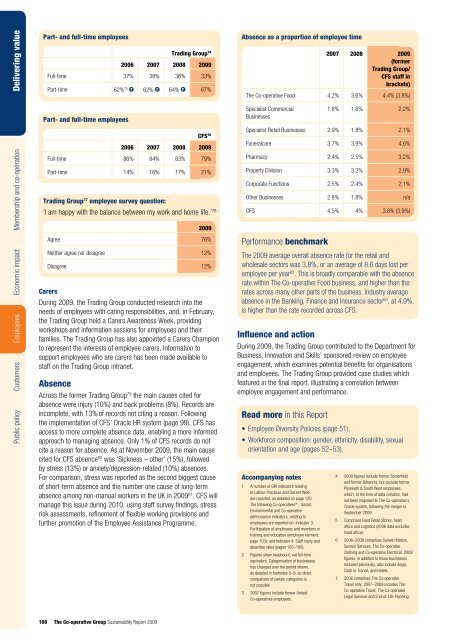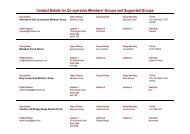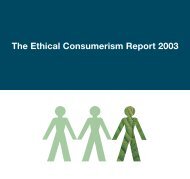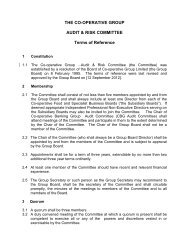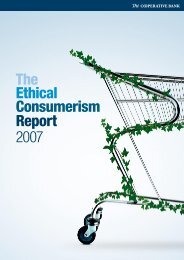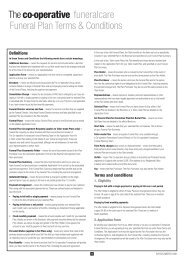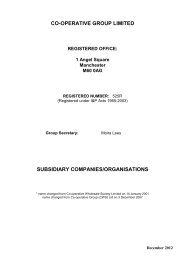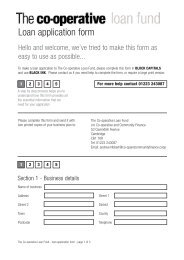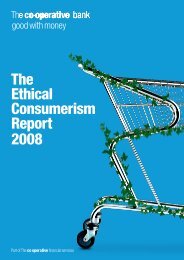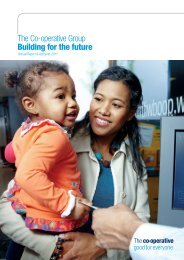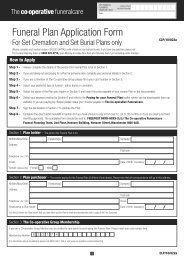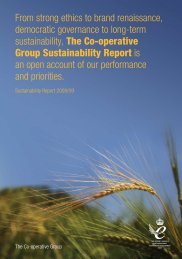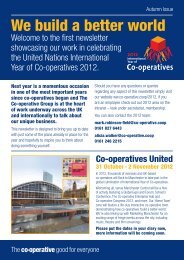Sustainability Report 2009 - The Co-operative
Sustainability Report 2009 - The Co-operative
Sustainability Report 2009 - The Co-operative
You also want an ePaper? Increase the reach of your titles
YUMPU automatically turns print PDFs into web optimized ePapers that Google loves.
Public policy Customers Employees Economic impact Membership and co-operation<br />
Delivering value<br />
Part- and full-time employees<br />
Part- and full-time employees<br />
Carers<br />
Trading Group 74<br />
2006 2007 2008 <strong>2009</strong><br />
Full-time 37% 38% 36% 33%<br />
Part-time 62% 75 r 62% r 64% r 67%<br />
CFS 76<br />
2006 2007 2008 <strong>2009</strong><br />
Full-time 86% 84% 83% 79%<br />
Part-time 14% 16% 17% 21%<br />
Trading Group 77 employee survey question:<br />
‘I am happy with the balance between my work and home life.’ 78<br />
<strong>2009</strong><br />
Agree 76%<br />
Neither agree nor disagree 12%<br />
Disagree 12%<br />
During <strong>2009</strong>, the Trading Group conducted research into the<br />
needs of employees with caring responsibilities, and, in February,<br />
the Trading Group held a Carers Awareness Week, providing<br />
workshops and information sessions for employees and their<br />
families. <strong>The</strong> Trading Group has also appointed a Carers Champion<br />
to represent the interests of employee carers. Information to<br />
support employees who are carers has been made available to<br />
staff on the Trading Group intranet.<br />
Absence<br />
Across the former Trading Group 79 the main causes cited for<br />
absence were injury (10%) and back problems (8%). Records are<br />
incomplete, with 13% of records not citing a reason. Following<br />
the implementation of CFS’ Oracle HR system (page 99), CFS has<br />
access to more complete absence data, enabling a more informed<br />
approach to managing absence. Only 1% of CFS records do not<br />
cite a reason for absence. As at November <strong>2009</strong>, the main cause<br />
cited for CFS absence 80 was ‘Sickness – other’ (15%), followed<br />
by stress (13%) or anxiety/depression-related (10%) absences.<br />
For comparison, stress was reported as the second biggest cause<br />
of short-term absence and the number one cause of long-term<br />
absence among non-manual workers in the UK in <strong>2009</strong> 81 . CFS will<br />
manage this issue during 2010, using staff survey findings, stress<br />
risk assessments, refinement of flexible working provisions and<br />
further promotion of the Employee Assistance Programme.<br />
Absence as a proportion of employee time<br />
Performance benchmark<br />
<strong>The</strong> <strong>2009</strong> average overall absence rate for the retail and<br />
wholesale sectors was 3.8%, or an average of 8.6 days lost per<br />
employee per year 82 . This is broadly comparable with the absence<br />
rate within <strong>The</strong> <strong>Co</strong>-<strong>operative</strong> Food business, and higher than the<br />
rates across many other parts of the business. Industry average<br />
absence in the Banking, Finance and Insurance sector 83 , at 4.9%,<br />
is higher than the rate recorded across CFS.<br />
Influence and action<br />
During <strong>2009</strong>, the Trading Group contributed to the Department for<br />
Business, Innovation and Skills’ sponsored review on employee<br />
engagement, which examines potential benefits for organisations<br />
and employees. <strong>The</strong> Trading Group provided case studies which<br />
featured in the final report, illustrating a correlation between<br />
employee engagement and performance.<br />
Read more in this <strong>Report</strong><br />
Accompanying notes<br />
1 A number of GRI indicators relating<br />
to Labour Practices and Decent Work<br />
are reported, as detailed on page 120.<br />
<strong>The</strong> following <strong>Co</strong>-<strong>operative</strong>s UK , Social,<br />
Environmental and <strong>Co</strong>-<strong>operative</strong><br />
performance indicators, relating to<br />
employees are reported on: Indicator 3:<br />
Participation of employees and members in<br />
training and education (employee element:<br />
page 103); and Indicator 4: Staff injury and<br />
absentee rates (pages 105–106).<br />
2 Figures show headcount, not full-time<br />
equivalent. Categorisation of businesses<br />
has changed over the period shown,<br />
as detailed in footnotes 5–9, so direct<br />
comparison of certain categories is<br />
not possible.<br />
3 2007 figures include former United<br />
<strong>Co</strong>-<strong>operative</strong>s employees.<br />
2007 2008 <strong>2009</strong><br />
(former<br />
Trading Group/<br />
CFS staff in<br />
brackets)<br />
<strong>The</strong> <strong>Co</strong>-<strong>operative</strong> Food 4.2% 3.6% 4.4% (3.8%)<br />
Specialist <strong>Co</strong>mmercial<br />
Businesses<br />
1.8% 1.6% 2.2%<br />
Specialist Retail Businesses 2.9% 1.8% 2.1%<br />
Funeralcare 3.7% 3.9% 4.6%<br />
Pharmacy 2.4% 2.5% 3.2%<br />
Property Division 3.3% 3.2% 2.9%<br />
<strong>Co</strong>rporate Functions 2.5% 2.4% 2.1%<br />
Other Businesses 2.8% 1.8% n/a<br />
CFS 4.5% 4% 3.8% (3.9%)<br />
• Employee Diversity Policies (page 51).<br />
• Workforce composition: gender, ethnicity, disability, sexual<br />
orientation and age (pages 52–53).<br />
4 <strong>2009</strong> figures include former Somerfield<br />
and former Britannia, but exclude former<br />
Plymouth & South West employees,<br />
which, at the time of data collation, had<br />
not been migrated to <strong>The</strong> <strong>Co</strong>-<strong>operative</strong>’s<br />
Oracle system, following the merger in<br />
September <strong>2009</strong>.<br />
5 <strong>Co</strong>mprises Food Retail Stores, head<br />
office and Logistics (2006 data excludes<br />
head office).<br />
6 2006–2008 comprises Sunwin Motors,<br />
Sunwin Services, <strong>The</strong> <strong>Co</strong>-<strong>operative</strong><br />
Clothing and <strong>Co</strong>-<strong>operative</strong> Electrical. <strong>2009</strong><br />
figures, in addition to those businesses<br />
included previously, also include Aegis,<br />
Cash in Transit, and Hotels.<br />
7 2006 comprises <strong>The</strong> <strong>Co</strong>-<strong>operative</strong><br />
Travel only; 2007–<strong>2009</strong> includes <strong>The</strong><br />
<strong>Co</strong>-<strong>operative</strong> Travel, <strong>The</strong> <strong>Co</strong>-<strong>operative</strong><br />
Legal Services and End-of-Life Planning.<br />
106<br />
<strong>The</strong> <strong>Co</strong>-<strong>operative</strong> Group <strong>Sustainability</strong> <strong>Report</strong> <strong>2009</strong>


